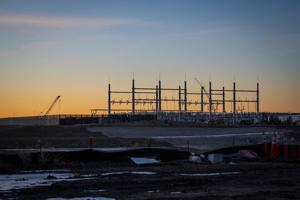Science
Data Centers: Building Blocks of Economic Growth for Communities

Data centers are emerging as vital components of local economies, particularly in rural areas that have traditionally relied on agriculture or resource extraction. These facilities, often perceived merely as large structures housing computers, play a crucial role in supporting a diverse and resilient economic landscape. The impact of data centers extends beyond their physical presence; they are essential for the digital infrastructure that powers everyday activities, from online searches to cloud storage.
Understanding the significance of data centers involves recognizing their function in the digital ecosystem. Every time an individual accesses information online, they rely on a network of data centers scattered across the country. These facilities enable devices to retrieve information quickly and efficiently, underscoring their critical role in the modern world.
Economic Opportunities in Rural Areas
Rural communities stand to benefit significantly from the data center boom. Large facilities require ample space but also need to be close to population centers to reduce latency—the delay in transmitting data. This strategic positioning often places data centers just outside metropolitan areas, allowing them to tap into major markets while benefiting from lower land costs.
For counties that have faced economic challenges, the introduction of a data center can provide a much-needed source of tax revenue and improve local infrastructure. While these facilities may not offer hundreds of jobs directly, they create a ripple effect throughout the economy. The servers within these centers support various sectors, including digital businesses, logistics, health systems, and manufacturing, ultimately anchoring numerous jobs in related fields such as development, cybersecurity, and technical services.
The fiscal advantages of data centers can be substantial. When combined with prudent local budgeting, towns can leverage these investments to maintain lower taxes and enhance community services. For instance, data centers in Loudoun County, Virginia, contribute $26 in taxes for every $1 they require in public services, significantly benefiting local schools and developments.
Addressing Resource Use Concerns
Discussions surrounding data centers often spark confusion regarding their resource consumption, particularly when comparisons are made to residential energy and water usage. Such comparisons are misleading, as they fail to account for the industrial nature of data centers. In reality, while the Department of Energy projects that data centers may triple their electricity consumption by 2028, this increase translates to a water usage comparable to irrigating 260 square miles of corn—merely 1 percent of total corn irrigation in the United States.
Moreover, major tech companies are committed to sustainable practices, including replenishing the water they consume. For electricity demands, partnerships between tech firms and local energy providers have proven effective. For example, Microsoft has invested in natural gas plants for reliability and entered contracts with wind farms to enhance local energy generation, ultimately bolstering the regional grid.
As the backbone of the cloud economy, data centers serve a wide array of industries, from healthcare to finance, as well as leisure activities like video streaming. For communities contemplating their economic future, the presence of a data center represents an opportunity to build the infrastructure necessary for growth.
Ultimately, the challenge for local leaders is to recognize this potential and ensure their communities reap the benefits associated with data center investments. Engaging with this evolving industry could pave the way for a more prosperous and diversified economic landscape.
Josh T. Smith, the Energy Policy Lead for the Abundance Institute, co-authored a guide on data centers released in July 2023. He advocates for communities to seize the opportunities presented by this growing sector.
-

 Science3 weeks ago
Science3 weeks agoInventor Achieves Breakthrough with 2 Billion FPS Laser Video
-

 Health4 weeks ago
Health4 weeks agoCommunity Unites for 7th Annual Into the Light Walk for Mental Health
-

 Top Stories4 weeks ago
Top Stories4 weeks agoCharlie Sheen’s New Romance: ‘Glowing’ with Younger Partner
-

 Entertainment4 weeks ago
Entertainment4 weeks agoDua Lipa Aces GCSE Spanish, Sparks Super Bowl Buzz with Fans
-

 Business4 weeks ago
Business4 weeks agoTyler Technologies Set to Reveal Q3 Earnings on October 22
-

 Entertainment4 weeks ago
Entertainment4 weeks agoMother Fights to Reunite with Children After Kidnapping in New Drama
-

 World4 weeks ago
World4 weeks agoR&B Icon D’Angelo Dies at 51, Leaving Lasting Legacy
-

 Health4 weeks ago
Health4 weeks agoCurium Group, PeptiDream, and PDRadiopharma Launch Key Cancer Trial
-

 Entertainment4 weeks ago
Entertainment4 weeks agoRed Sox’s Bregman to Become Free Agent; Tigers Commit to Skubal
-

 Health4 weeks ago
Health4 weeks agoNorth Carolina’s Biotech Boom: Billions in New Investments
-

 Science4 weeks ago
Science4 weeks agoNorth Carolina’s Biotech Boom: Billions Invested in Manufacturing
-

 Top Stories4 weeks ago
Top Stories4 weeks agoFormer Mozilla CMO Launches AI-Driven Cannabis Cocktail Brand Fast









